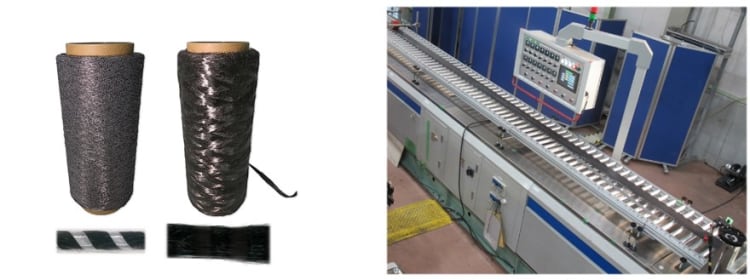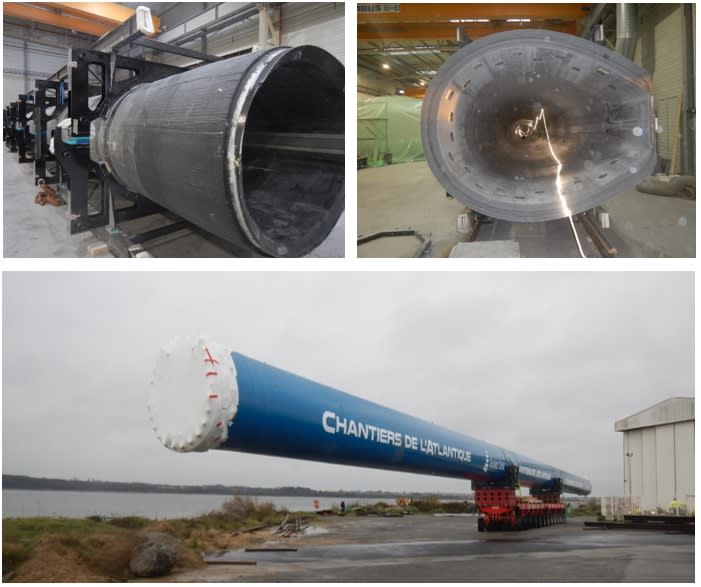Category: Circularity & recycyling
100% Recycled Cf Spun Yarn and Applied Products - Toyota industries Corporation (Japan)Partner(s): Kurimoto, Ltd., Japan - Nagoya University, Japan - Nakashima Propeller Co., Ltd., Japan - Toyota Central R&D Labs., Inc., Japan - Toyota Motor Corporation, Japan - Uster technologies AG, Switzerland
100% recycled CF spun yarn compatible to pultrusion process. Establishment of comprehensive CF circulation system from recycling to product application.
CFRP properties of rCF spun yarn achieve about 70% tensile strength and 90% elastic modulus compared to virgin CFRP. There is no limitation to the process and matrix, and we are the world's first manufacturer that successfully utilizes rCF in pultrusion molding with epoxy resin. Due to wind energy market growth, we expect future rCF spun yarn application to the demand for carbon neutral production for wind power generation blades. Furthermore, we established a comprehensive CF recycling system from CF recovery to reproduction (…).
Key benefits
- Applicable recycle CF to pultrusion molding using epoxy matrix
- Recycled CFRP highly compatible with virgin CFRP performance
- A comprehensive high value CF recycling system
- High compatibility for existing process and resin matrix
- Low environmental impact

Category: Digital, AI & data
In-Process AFP Manufacturing Inspection System - Niar WSU (United States)In-process AFP Manufacturing Inspection System (IAMIS) for automated fiber placement (AFP) head to detect manufacturing defects and a user-friendly augmented reality visualization module.
IAMIS detects manufacturing defects that are above the certification basis (or unacceptable) using machine-learning (ML) algorithms for reducing time-consuming and operator-dependent manual inspection processes that require significantly interrupting the manufacturing process.
Key benefits:
- Increase automated manufacturing system utilization (operational efficiency)
- Eliminate labor-intensive manual inspections and improve quality
- Eliminate human error associated with operator experience levels
- Augmented reality visualization for repair and quality assurance
- Create a digital record of defects for certification and sustainment support

Category: Equipment, machinery & heavy industries
Isotruss Carbon Fiber Tower - IsoTruss, Inc (United States)Partners(s): My Learning Alliance, US - U.S. Bureau of Land Management Wyoming, United States – United States Department of Agriculture National Institute of Food and Agriculture (USDA- NIFA), United States - Utah State University, United States
IsoTruss Carbon Fiber Towers are up to twelve times stronger than steel for a given weight, or as little as one-twelfth the weight for a given load, depending on the design, site and specifications.
IsoTruss was originally invented for aerospace applications and is ideally suited in load bearing structures anywhere low weight and stiffness are critical. Overall, the IsoTruss combines high performing continuous fiber (such as carbon, glass, aramid, etc.) reinforced polymer composite materials with a very efficient geometry to allow those elements to carry the load efficiently, allowing extremely lightweight and extremely high performance.
Key benefits:
- Material Advantages: High Strength/High Stiffness/High Durability/
- Transversely Isotropic/Radio Frequency Transparent/Corrosion Resistant
- Structural Advantages: Resists Shell Buckling/Lighter Weight/Low Drag/
- Damage Tolerant/Aesthetics/Eco-Friendly/Corrosion Resistant
- Less CF to mfg/lightweight lowers shipping/install costs-reduces CO2 em.by 70%

Category: Maritime transportation & shipbuilding
Solid Sail Mast - Chantiers de L'atlantique (France)Partners: Avel Robotic, France - Bureau Veritas, France - CDK, France - Hexcel, France - Lorima, France - Meca, France - Multiplast, France - SMM, France
Industrialization of the fabrication of very large mast to fit to price and delay of marine industry market.
Solid sail mast fabrication is based on carbon preg pieces made in autoclave. We cut the mast in sections able to enter the largest autoclave (24m x 6m) we had and develop an assembly method using AFP fabricated sleeves to assembly the 24m long sections together in a quick and efficient way.
Key benefits:
- Higher quality standard through precisely automated lamination
- Higher productivity from faster/fewer manufacturing processes
- Lower production cost from reduction of processes
- Reduced waste and reduced manufacturing hazard
- Higher consistency in the mass manufacturing of parts



